初中英语人教版七下Unit 4 Don't eat in class. 随堂测试题 (含解析)
文档属性
| 名称 | 初中英语人教版七下Unit 4 Don't eat in class. 随堂测试题 (含解析) |

|
|
| 格式 | docx | ||
| 文件大小 | 24.7KB | ||
| 资源类型 | 教案 | ||
| 版本资源 | 人教新目标(Go for it)版 | ||
| 科目 | 英语 | ||
| 更新时间 | 2023-09-10 00:00:00 | ||
图片预览

文档简介
Unit 4 Don’t eat in class.
Section B (1a-1d)
一、根据句意及汉语提示完成单词
1. Rules are very _______ (重要的) here.
2. In a ______ (可怕的) storm the ship hit a rock and broke into pieces.
3. She _______ (记得) that she was going to the social club that evening.
4. He is _______ (学习) to play the piano.
5. To _______ (保持) warm they burnt wood in a small room.
二、用所给单词的适当形式填空
1. Can we ________ (wear) hats in school
2. _________ (not be) late. It’s your first day to school.
3. There _______ (be) a lot of books on the desk.
4. You must remember (clean) the classroom.
5. You don’t like singing songs. I don’t like it, _______ (too).
三、句型转换
1. Students can run and talk loudly in the hallways. (改为否定句)
Students __________ run __________ talk loudly in the hallways.
2. Maria has to practice the piano on Sundays. (改为一般疑问句)
__________ Maria __________ __________ practice the piano on Sundays
3. You can’t eat in the classroom. (改为否定祈使句)
__________ __________ in the classroom.
4. You must look after your sister. (改为同义句)
You ________ ________ look after your sister.
5. They have to clean the classroom every day. (对画线部分提问)
_________ _________they have to _________ every day
四、书面表达
无论在家里还是在学校里刘刚总有许多制度要遵守,他很苦恼。于是,他就写信给他的好朋友Jack,倾诉他内心的不快。请你根据汉语提示制订出他的rules,然后帮他写信给Jack。词数不少于60词。
1.6:30起床; 2.在校穿校服;
3.上课不准迟到; 4.上课时不能戴帽子;
5.在家不能看电视,每晚练钢琴; 6.9:00上床睡觉;
7.周末打扫房间,洗衣服。
____________________________________________________________________________________________________________________________________________________________________________________________________________________________________________________________________________________________________________________________
参考答案
一、
1. important 系动词be后面跟形容词,important意为“重要的”。
2. terrible 句意:在一次可怕的暴风雨中,船被礁石撞破了。
3. remembered 句意:她记起来那晚她正要去社交俱乐部。由was going to可知此处用动词remember的过去式。
4. learning 句意:他正在学习弹钢琴。由句中的is可知本句为现在进行时,所以填learning。
5. keep 句意:他们在一个小房间里烧木柴来保暖。句中不定式短语作目的状语,所以填动词原形。
二、
1. wear 情态动词can后面跟动词原形。
2. Don’t be 本句为祈使句,并且表示否定意义,所以填Don’t be。
3. are 句子主语为名词复数,所以此处填are。
4. to clean remember to do sth.意为“记得做某事”。
5. either 在否定句中表示“也”且在句末,用either。
三、
1. can’t, or 2. Does, have to 3. Don’t eat 4. have to 5. What do, do
四、One possible version:
Dear Jack,
I’m not happy every day. I have too many rules at school and in my house. I have to get up at 6:30 in the morning. I have to wear a uniform at school. I can’t arrive late for class. I can’t wear a hat in class, either. At home I can’t watch TV. I have to practice playing the piano every evening. I have to go to bed at 9:00. At the weekend I have to clean my room and wash my clothes. I don’t have any fun every day. What can I do
Yours,
Liu Gang
Section B (1a-1d)
一、根据句意及汉语提示完成单词
1. Rules are very _______ (重要的) here.
2. In a ______ (可怕的) storm the ship hit a rock and broke into pieces.
3. She _______ (记得) that she was going to the social club that evening.
4. He is _______ (学习) to play the piano.
5. To _______ (保持) warm they burnt wood in a small room.
二、用所给单词的适当形式填空
1. Can we ________ (wear) hats in school
2. _________ (not be) late. It’s your first day to school.
3. There _______ (be) a lot of books on the desk.
4. You must remember (clean) the classroom.
5. You don’t like singing songs. I don’t like it, _______ (too).
三、句型转换
1. Students can run and talk loudly in the hallways. (改为否定句)
Students __________ run __________ talk loudly in the hallways.
2. Maria has to practice the piano on Sundays. (改为一般疑问句)
__________ Maria __________ __________ practice the piano on Sundays
3. You can’t eat in the classroom. (改为否定祈使句)
__________ __________ in the classroom.
4. You must look after your sister. (改为同义句)
You ________ ________ look after your sister.
5. They have to clean the classroom every day. (对画线部分提问)
_________ _________they have to _________ every day
四、书面表达
无论在家里还是在学校里刘刚总有许多制度要遵守,他很苦恼。于是,他就写信给他的好朋友Jack,倾诉他内心的不快。请你根据汉语提示制订出他的rules,然后帮他写信给Jack。词数不少于60词。
1.6:30起床; 2.在校穿校服;
3.上课不准迟到; 4.上课时不能戴帽子;
5.在家不能看电视,每晚练钢琴; 6.9:00上床睡觉;
7.周末打扫房间,洗衣服。
____________________________________________________________________________________________________________________________________________________________________________________________________________________________________________________________________________________________________________________________
参考答案
一、
1. important 系动词be后面跟形容词,important意为“重要的”。
2. terrible 句意:在一次可怕的暴风雨中,船被礁石撞破了。
3. remembered 句意:她记起来那晚她正要去社交俱乐部。由was going to可知此处用动词remember的过去式。
4. learning 句意:他正在学习弹钢琴。由句中的is可知本句为现在进行时,所以填learning。
5. keep 句意:他们在一个小房间里烧木柴来保暖。句中不定式短语作目的状语,所以填动词原形。
二、
1. wear 情态动词can后面跟动词原形。
2. Don’t be 本句为祈使句,并且表示否定意义,所以填Don’t be。
3. are 句子主语为名词复数,所以此处填are。
4. to clean remember to do sth.意为“记得做某事”。
5. either 在否定句中表示“也”且在句末,用either。
三、
1. can’t, or 2. Does, have to 3. Don’t eat 4. have to 5. What do, do
四、One possible version:
Dear Jack,
I’m not happy every day. I have too many rules at school and in my house. I have to get up at 6:30 in the morning. I have to wear a uniform at school. I can’t arrive late for class. I can’t wear a hat in class, either. At home I can’t watch TV. I have to practice playing the piano every evening. I have to go to bed at 9:00. At the weekend I have to clean my room and wash my clothes. I don’t have any fun every day. What can I do
Yours,
Liu Gang
同课章节目录
- Unit 1 Can you play the guitar?
- Section A
- Section B
- Unit 2 What time do you go to school?
- Section A
- Section B
- Unit 3 How do you get to school?
- Section A
- Section B
- Unit 4 Don't eat in class.
- Section A
- Section B
- Unit 5 Why do you like pandas?
- Section A
- Section B
- Unit 6 I'm watching TV.
- Section A
- Section B
- Review of Units 1-6
- Unit 7 It's raining!
- Section A
- Section B
- Unit 8 Is there a post office near here?
- Section A
- Section B
- Unit 9 What does he look like?
- Section A
- Section B
- Unit 10 I'd like some noodles.
- Section A
- Section B
- Unit 11 How was your school trip?
- Section A
- Section B
- Unit 12 What did you do last weekend?
- Section A
- Section B
